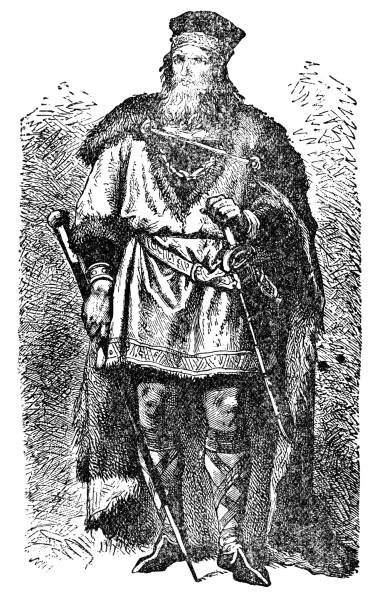Today in History
These Are The Greatest Conquerors The World Has Seen

The world has seen many great conquerors throughout history who have left their mark on civilization through their military prowess, strategic brilliance, and conquests of vast territories. These legendary leaders have shaped the course of history, building vast empires and leaving a lasting legacy that continues to be studied and admired to this day. Here, we delve into the lives and conquests of some of the greatest conquerors in history.
1. Genghis Khan (1162-1227):
Genghis Khan, born as Temüjin, was the founder of the Mongol Empire, which became the largest contiguous land empire in history. Through his military campaigns and strategic brilliance, Genghis Khan conquered vast territories across Asia and Europe, uniting the Mongol tribes and establishing a powerful empire that lasted for centuries. His leadership, military tactics, and administrative reforms laid the foundation for the Mongol Empire’s expansion and success.
2. Alexander the Great (356-323 BC):
Alexander the Great, the King of Macedon, is renowned for his conquests of the Persian Empire, Egypt, and parts of India, creating one of the largest empires of the ancient world. Known for his military genius, charismatic leadership, and vision of spreading Greek culture and civilization, Alexander’s conquests reshaped the political and cultural landscape of the ancient world. His empire, known as the Hellenistic period, brought Greek influence to regions across three continents.
3. Julius Caesar (100-44 BC):
Julius Caesar, the Roman general and statesman, is one of history’s most influential conquerors, known for his military campaigns, political reforms, and rise to power as dictator of Rome. Caesar’s conquest of Gaul, his civil war with Pompey, and his reforms in Rome transformed the Roman Republic into the Roman Empire. His military victories, political acumen, and charisma established him as a central figure in Roman history, whose legacy continues to shape politics and leadership today.
4. Napoleon Bonaparte (1769-1821):
Napoleon Bonaparte, the French military leader and Emperor, is renowned for his military conquests, administrative reforms, and impact on European history. Napoleon’s campaigns across Europe, his establishment of the Napoleonic Code, and his ambitions for empire-building led to the rise and fall of the French Empire. His military strategies, innovative tactics, and political maneuvering transformed the map of Europe and shaped the course of modernhistory. Napoleon’s military genius, strategic vision, and ability to inspire his troops made him one of the greatest conquerors of his time. His leadership during the Napoleonic Wars left a lasting impact on Europe, influencing political structures, warfare tactics, and international relations for years to come.
5. Emperor Qin Shi Huang (259-210 BC):
Emperor Qin Shi Huang, the first Emperor of China, is known for unifying the Warring States of China and establishing the Qin Dynasty. His conquests and military campaigns resulted in the unification of China under a centralized imperial system, laying the groundwork for the country’s later dynasties. Qin Shi Huang’s reign introduced significant political, economic, and cultural changes, including the construction of the Great Wall of China and the standardization of measurements, writing systems, and currency.
6. Tamerlane (1336-1405):
Tamerlane, or Timur the Lame, was a Turco-Mongol conqueror who established the Timurid Empire in Central Asia and Persia. Known for his military campaigns, Tamerlane conquered vast territories from the Mediterranean to India, leaving a trail of destruction and building a powerful empire that rivaled the great empires of the time. His strategic brilliance, military tactics, and ruthless leadership style made him one of the most formidable conquerors of the 14th century.
7. Catherine the Great (1729-1796):
Catherine the Great, Empress of Russia, is remembered for her conquests, political reforms, and cultural patronage during her reign. Catherine expanded the Russian Empire through military campaigns in the Black Sea region, Crimea, and Poland, solidifying Russia’s status as a major European power. Her reign saw the Enlightenment influence Russian society and culture, leading to significant advancements in education, arts, and governance.
8. Attila the Hun (406-453 AD):
Attila the Hun, the feared leader of the Hunnic Empire, was known for his military campaigns across Europe and his ruthless conquests of Roman territories. Attila’s invasions and conquests struck fear into the hearts of the Roman Empire and its allies, earning him the nickname “Scourge of God.” His strategic military tactics, ability to unite diverse tribes, and relentless pursuit of conquest made him a formidable adversary and a legendary conqueror of the ancient world.
-

 Breaking News3 years ago
Breaking News3 years agoBREAKING: CBN Redesigns Naira Notes
-

 Breaking News2 years ago
Breaking News2 years agoBREAKING: Tinubu Considers Temporary Subsidy On Petrol
-

 Breaking News2 years ago
Breaking News2 years agoJUST IN: Gbajabiamila Dies In UK
-

 News3 years ago
News3 years agoDrama As Church Gives Certificate Of Virginity To Ladies After Testing Them (See Photos)
-

 Crime4 years ago
Crime4 years agoUproar As Student Teacher On Teaching Practice Impregnates 24 Girls, Headmistress, Four Female Teachers
-

 Breaking News10 months ago
Breaking News10 months agoJUST IN : Sacked Osun LG Chairman Killed Few Minutes After Returning To Office
-

 Breaking News2 years ago
Breaking News2 years agoBREAKING: Dangote Speaks As BUA Reduces Price Of Cement
-

 Crime3 years ago
Crime3 years agoJUST IN: Gunmen Storm Osogbo, Kill Man, Daughter Few Hours After His Wife Put To Bed (Photos)
